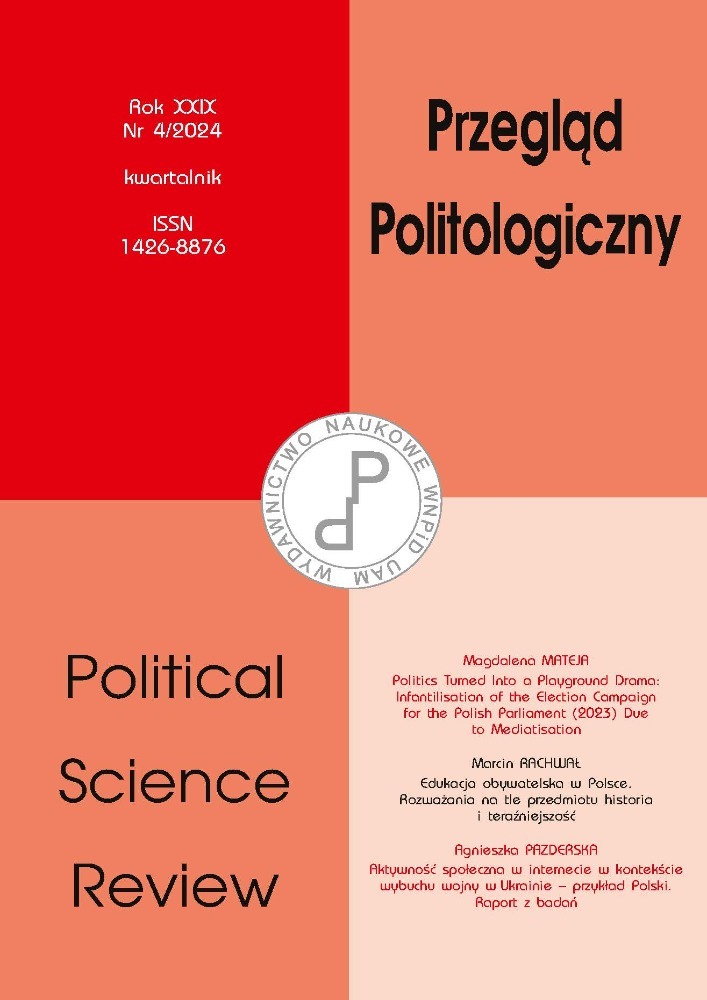Abstrakt
Artykuł analizuje negocjacje akcesyjne Serbii z UE (2014–2024), koncentrując się na wzajemnym oddziaływaniu polityki wewnętrznej i celów polityki zagranicznej. Pragmatyczna polityka zagraniczna Serbii równoważy aspiracje UE ze strategicznymi partnerstwami (Rosja, Chiny, USA), odzwierciedlając jej kontekst historyczny (Ruch Państw Niezaangażowanych) i kwestię Kosowa. Wykorzystując metodologię jakościową, w tym przegląd literatury i wywiady z serbskimi aktorami politycznymi (politykami, ekspertami i urzędnikami państwowymi), niniejszy artykuł omawia wyzwania w negocjacjach z UE i nieznaczne postępy, wskazując na nierozwiązaną kwestię Kosowa jako jedną z głównych przeszkód politycznych. Pomimo deklarowanych przez serbski rząd priorytetów, analiza sugeruje rozdźwięk między retoryką a działaniami zarówno UE, jak i serbskich elit politycznych. Zaangażowanie UE w regionie jest oczywiste (np. Plan Wzrostu Bałkanów Zachodnich), ale wewnętrzna polityka Serbii i jej ambiwalentne stanowisko znacznie zmniejszają prawdopodobieństwo szybkiego przystąpienia do UE. Niniejszy artykuł oferuje wgląd w złożoność integracji Serbii z UE z perspektywy krajowych aktorów politycznych.
Bibliografia
Bartlett W., Uvalić M. (2022), Towards Economic Inclusion in the Western Balkans, Palgrave Macmillan Cham. DOI: https://doi.org/10.1007/978-3-031-06112-7
Bazić J. (2019), Relations of Serbia and European Union: Socio-Historical Determinants and the Contemporary Political Issues, “Politeja”, 3(60), pp. 303–322. DOI: https://doi.org/10.12797/Politeja.16.2019.60.20
Beckmann-Dierkes N., Rankić S. (2022), Serbian Foreign Policy in the Wake of the War in Ukraine: The Four Pillars of Foreign Policy, the Kosovo Issue, and the War in Ukraine, Konrad-Adenauer-Stiftung e. V.
Bieber F. (2013), EU Conditionality in the Western Balkans, Routledge.
Bieber F. (2018), The Rise (and Fall) of Balkan Stabilitocracies, “Horizons: Journal of International Relations and Sustainable Development”, 10, pp. 176–185, https://www.jstor.org/stable/48573486.
Bujwid-Kurek E. (2016), EU aspirations of the Republic of Serbia – an overview, „Przegląd Europejski”, 40(2). DOI: https://doi.org/10.31338/1641-2478pe.2.16.1
Canveren O., Aknur M. (2020), European Union Agenda in Serbia’s Party Politics: A Clash between Rationality and Identity Politics, “Romanian Journal of Political Science”, 20(1).
Denzin N. K., Lincoln Y. S. (2005), The SAGE Handbook of Qualitative Research, Sage Publications.
DG NEAR (2024), Statement by President von der Leyen at the Berlin Process Summit, https://neighbourhood-enlargement.ec.europa.eu/news/statement-president-von-der-leyen-berlin-process-summit-2024-10-14_en.
Džankić J., Keil S., Kmezić M. (eds.) (2019), The Europeanisation of the Western Balkans. A failure of EU conditionality?, Palgrave MacMillan, London. DOI: https://doi.org/10.1007/978-3-319-91412-1
Džuverović N., Stojarová V. (eds.) (2023), Peace and Security in the Western Balkans: A Local Perspective, Routledge. DOI: https://doi.org/10.4324/9781003276661
Ejdus F. (2020), Crisis and Ontological Insecurity. Serbia’s Anxiety over Kosovo’s Secession, Palgrave Macmillan. DOI: https://doi.org/10.1007/978-3-030-20667-3
European Commission (2003), EU-Western Balkans Summit Thessaloniki, 21 June 2003, https://ec.europa.eu/commission/presscorner/detail/en/pres_03_163.
European Commission (2022) Commission Staff Working Document: Serbia 2022 Report, https://www.stat.gov.rs/media/358410/serbia-report-2022-1.pdf
European Commission (2023), Key findings of the 2023 Report on Serbia, https://ec.europa.eu/commission/presscorner/detail/en/qanda_23_5628.
European Commission (2024), European Neighbourhood Policy and Enlargement Negotiations (DG NEAR): Serbia, https://neighbourhood-enlargement.ec.europa.eu/enlargement-policy/serbia_en.
EWB (2023), Eurobarometer survey: Trust in the EU varies across the Western Balkans, European Western Balkans, https://europeanwesternbalkans.com/2023/07/11/eurobarometer-survey-trust-in-the-eu-varies-across-the-western-balkans/.
Fagan A., Wunsch N. (2019), Fostering institutionalisation? The impact of the EU accession process on state-civil society relations in Serbia, “Acta Politica”, 54, pp. 607–624. DOI: https://doi.org/10.1057/s41269-018-0093-1
Freedom House (2024a), Serbia, https://freedomhouse.org/country/serbia.
Freedom House (2024b), Nations in Transit Report: Serbia, https://freedomhouse.org/country/serbia/nations-transit/2024.
Gerring J. (2004), What is a case study and what is it good for?, “American Political Science Review”, 98(2), pp. 341–354. DOI: https://doi.org/10.1017/S0003055404001182
Hebda W. (2020), The Republic of Serbia: Stuck in the grey zone of democratization?, „Rocznik Instytutu Europy Środkowo-Wschodniej”, 18(2020), z. 3, pp. 173–194. DOI: https://doi.org/10.36874/RIESW.2020.3.8
Heemskerk E. (2020), Bringing Europe to the Western Balkans: The Europeanisation of Croatia and Serbia Compared. College of Europe, EU Diplomacy Papers, no. 6, https://www.coleurope.eu/sites/default/files/research-paper/edp_6-2020_heemskerk_0.pdf.
Jović D. (2018), Accession to the European Union and Perception of External Actors in the Western Balkans, “Croatian International Relations Review”, XXIV(83). DOI: https://doi.org/10.2478/cirr-2018-0012
Korzeniewska-Wiszniewska M. (2019), Dynamics of the Serbian EU accession process – key issues and the challenges of state democratisation in an era of populism, „Rocznik Instytutu Europy Środkowo-Wschodniej”, 17, Issue no. 4, pp. 49–77. DOI: https://doi.org/10.36874/RIESW.2019.4.3
Lubik-Reczek N. (2016), Serbia elections: The path towards Europe?, “Przegląd Politologiczny”, no. 4. DOI: https://doi.org/10.14746/pp.2016.21.4.3
National Assembly (2024), Number of mandates won – XIV National Assembly Convocation, http://www.parlament.gov.rs/national-assembly/national-assembly-in-numbers/national-assembly-in-numbers.1743.html.
Pavlović S. (2017), West Is Best: How ‘Stabilitocracy’ Undermines Democracy Building In The Balkans, EUROPP, https://blogs.lse.ac.uk/europpblog/2017/05/05/west-is-best-how-stabilitocracy-undermines-democracy-building-in-the-balkans/.
Sekulić T. (2020), The European Union and the Paradox of Enlargement, The Complex Accession of the Western Balkans, Palgrave Macmillan. DOI: https://doi.org/10.1007/978-3-030-42295-0
Stojić M. (2022), Contesting the EU on the periphery in times of crisis: party-based Euroscepticism in Serbia, “East European Politics”, 38, Issue 3, pp. 358–381. DOI: https://doi.org/10.1080/21599165.2021.1993191
Styczyńska N. (2023), Direction East: Polish views on the EU’s enlargement policy, in: Enlargement and the future of Europe: views from the capitals, eds. M. Kaeding, J. Pollak, P. Schmidt, Springer. DOI: https://doi.org/10.1007/978-3-031-43234-7_20
Styczyńska N., Dajč H. (2022), Between the past and the future. Eurosceptic political parties and the EU integration of Serbia, in: The Right-Wing Critique of Europe: Nationalist, Sovereignist and Right-Wing Populist Attitudes to the EU, eds. J. Sondel-Cedarmas, F. Berti, Routledge. DOI: https://doi.org/10.4324/9781003226123-14
Subotić J. (2010), Explaining difficult states: The problems of Europeanization in Serbia, “East European Politics and Societies”, 24(4), pp. 595–616. DOI: https://doi.org/10.1177/0888325410368847
Uvalić M. (ed.) (2023), Integrating the Western Balkans into the EU: Overcoming Mutual Misperceptions, Palgrave Macmillan. DOI: https://doi.org/10.1007/978-3-031-32205-1
V-Dem Institute (2022), Democracy Report 2022: Autocratization Changing Nature?
Vladisavljev S. (2022), The Rise of the Sino-Serbian Brotherhood – Can Serbia Use Its Partnership with China for Good?, in: The Role of China in Southeast Europe, Friedrich-Ebert-Stiftung.
Vučković V. (2023, June 18), Srbija između rastućih aspiracija i realnih ograničenja politike male države, N1 TV, https://n1info.rs/vesti/srbija-izmedju-rastucih-aspiracija-i-realnih-ogranicenja-politike-male-drzave/.
Interviews:
Interview EXI 1, Expert, 14.06.2024
Interview EXI 2, Expert, 26.06.2024.
Interview EXI 3, Expert, 28.06.2024.
Interview PPI 1, Politician, 14.06.2024.
Interview PPI 2, Politician, 17.06.2024.
Interview PPI 3, Politician, 20.06.2024.
Interview PPI 4, Politician, 20.06.2024
Interview PPI 5, Politician, 25.06.2024.
Interview PPI 6, Politician, 26.06.2024.
Interview PPI 7, Politician, 26.06.2024. DOI: https://doi.org/10.22233/20412495.0724.26
Interview PPI 8, Politician, 27.06.2024.
Interview PA 1, Public administration, 21.06.2024.
Interview PA 2, Public administration, 23.09.2024. DOI: https://doi.org/10.69581/RJPA.2024.09.02
Licencja
Prawa autorskie (c) 2024 Natasza Styczyńska

Utwór dostępny jest na licencji Creative Commons Uznanie autorstwa – Na tych samych warunkach 4.0 Miedzynarodowe.

